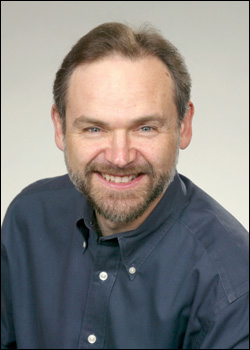On paper, Dave Ross is a great Democratic candidate in Washington’s 8th Congressional District. The 52-year-old KIRO-AM talk-show host has been dispensing drive-by wisdom from the headquarters of the Eastlake Avenue Crusaders for Common Sense since 1987. Since The Dave Ross Show is always among the most highly rated radio programs during its time slot, Ross has name recognition of 80 percent in the 8th District, which consists mostly of the southern and eastern suburbs of King County. According to a poll conducted by the Washington State Democratic Party, the district’s inhabitants also feel quite favorably disposed toward Ross, a Mercer Island resident. It’s no wonder. His radio show is a masterful mix of humor, entertainment, and thoughtful discussion of public affairs. On the air, Ross comes off as well informed, articulate, and difficult to pigeonhole politically. His sensibilities fit the district: fiscally conservative, patriotic, socially tolerant, and nonpartisan. It’s easy to see why the state Democratic Party recruited Ross to run for the open seat (Republican U.S. Rep. Jennifer Dunn is not seeking re-election), even though former high-tech executive Alex Alben has been actively campaigning for the nomination since last September and interior decorator Heidi Behrens-Benedict is mounting her fourth attempt to be elected to Congress. Ross immediately becomes the leading Democrat to match up against the GOP front-runner, King County Sheriff Dave Reichert (who is facing a vigorous challenge for the Republican nomination from former federal prosecutor Diane Tebelius and state Sen. Luke Esser).
Yet it is never certain how celebrities like Ross will fare as candidates. Last Thursday, May 20, when Ross announced he had decided to run for Congress, he made it clear he will run on his own terms, essentially trying to use his fame to reinvent the rules of the game he is entering. That doesn’t always work.
Talking to Ross about the race, one comes away with the sense of someone motivated by some very high-minded, and naive, notions about American politics and our role in the world. Ross tells a story about going to Communist Czechoslovakia during the Cold War and being incredibly inspired by the response of the people trapped behind the Iron Curtain. “We are a beacon of democracy, of freedom,” says Ross. “My overriding issue would be to present that face to the world again. There is no reason our country should be hated.
“To have a vote in Congress, it would be an incredible honor,” he says. “You can’t not consider it.”
Leaving aside for a moment the fact that America has always draped its imperial ambitions with a democratic cloth, Ross sounds like he is pursuing a noble calling instead of preparing to enter one of the nastiest, dirtiest blood sports of our nation. Ross proclaims that he will not engage in negative campaigning. “Do I have anything bad to say about Alex Alben? No. Do I have anything bad to say about Sheriff Dave Reichert? No.” In fact, Ross says, he admires Reichert.
His opponents will be unlikely to be so charitable. In fact, Ross’ announcement that he would continue to do his radio show until the filing deadline at the end of July drew sharp responses from his opponents. Alben demanded equal time on KIRO and strongly hinted at legal action. Alben’s campaign manager, Ben Vaught, made it very clear that the gloves are already off. “If talk-show hosts make good candidates, where is Gov. John Carlson?” asks Vaught, referring to the Republican KVI-AM talk-show host’s miserable showing against Democratic Gov. Gary Locke in 2000.
Ross’ belief that he can be a radio talk-show host and a congressional candidate simultaneously is also a strong indication that he doesn’t really know what he’s gotten himself into. Running for Congress is more than a full-time job. Fund raising, setting up a campaign staff, meeting and greeting voters, attending the events of every interest group—any candidate from any party will tell you it’s overwhelming.
His opponents are also claiming that Ross’ political independence will be a hindrance in the new partisan primary. Says political consultant Brett Bader, who is advising Esser: “The candidate farthest to the left will win the Democratic primary.” Alben’s campaign manager Vaught says: “Dave Ross is a supporter of charter schools. I’m not sure many Democrats are.”
Ross says that since the chair of the state Democratic Party has asked him to run, the party must be comfortable with his political independence. He acknowledges having positions that are not identified with the liberal wing of the Democratic Party— backing charter schools, being a free trader, and initially supporting the invasion of Iraq (although he now believes the war was “a wild goose chase”). But he says he has no intention of changing his points of view for political reasons. “The realities of a campaign are that pressure will be put on me to put things this way or that way. I’ve been expressing my point of view for too long now to have a wholesale change.”
Ross clearly thinks he can run for Congress without compromising his ideals. That stance seldom holds up during the pressure of a campaign, especially a victorious one.








